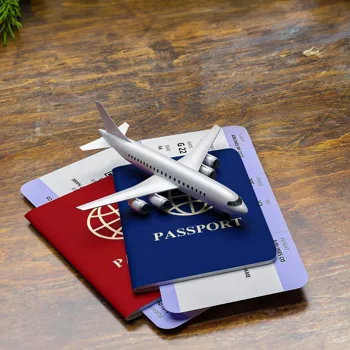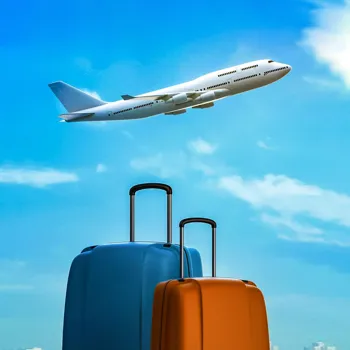Discover the must-have travel essentials before your next adventure! Don't miss out on these vital tips!
Namaste, fellow travellers! Planning a trip, whether it's a quick getaway to Goa or a longer journey
abroad, can be super exciting. However, amidst all the hype of booking flights and hotels, packing your bags, it's easy to overlook the most crucial aspect: your travel documents.
These documents are your best friends when you are moving from one place to other. They not only help you get from point A to point B but also help navigate foreign lands. Forgetting them can turn your dream vacation into a bureaucratic nightmare, a hurdle race with paperwork!
So, before you jet off, let's make sure you have all your ducks in a row. Here's a handy list of eight essential travel documents you absolutely need to have, to make sure that your trip is more fun and less problem.
Passport: Your Golden Ticket to International Adventures
Your passport is basically your identity card to the entire world. It's the most important document you'll need for international travel. Make sure your passport is valid for at least six months beyond your intended stay. Many countries won't let you in if your passport is expiring soon.

Also, take a moment to check the number of blank pages available, especially if you're visiting multiple countries. You'd want enough pages for those entry and exit stamps. Before you leave, make sure your passport isn't damaged in any way.
If your passport gets damaged, then it might spell trouble at the immigration and it might be considered as invalid identification. So, before you pack your bags, ensure that your passport is in perfect condition and is kept safely.
Carry multiple photocopies of your passport as well, which will assist you in times of emergency. Keep the photocopies separate from the original passport.
Visa: Your Permission Slip to Enter a Country
Not all countries let you in with just your passport. For many destinations, you will need a visa, which is basically an official permission to enter and stay in a specific country for a specific duration.
Visa rules and regulations vary from country to country, so it is really important to do your detailed research well in advance of your trip. Check the visa requirements for your destination country on their embassy or consulate website.
Apply for your visa well in advance, as processing times can take several weeks or even months. Don't wait until the last minute! You should also print copies of your visa and keep them handy.
It's also a good idea to keep a digital copy on your phone or cloud storage in case that the physical copy is lost or stolen.
Flight Tickets: Your Confirmed Spot in the Sky
This one is pretty obvious, but still very important. Always, always, always have your flight tickets, both your outbound and return tickets! Whether you have a traditional paper ticket or an e-ticket on your phone, make sure to have easy access to it.

It's a good idea to print a copy of your e-ticket, just in case your phone battery dies or you don't have internet access. Consider downloading your airline's app, as this often allows you to access your boarding pass and receive real-time updates about your flight.
This can save you a lot of trouble, time and effort. Cross-check your flight details carefully before you leave for the airport. Ensure that the flight number, date, and time are all correct.
Pay close attention to the baggage allowance and restrictions to avoid any last-minute surprises or extra charges at the airport.
Hotel Bookings and Accommodation Details: Your Home Away From Home
Having confirmed hotel bookings or accommodation details is important for a smooth trip, especially if you're arriving late at night or during peak season. Keep a copy of your hotel confirmation email with you, including the address, phone number, and booking reference number.

This will make check-in easier and also provide proof of your travel plans to immigration officials if asked. If you're staying with family or friends, it's helpful to have their address and contact information handy. It's also a good idea to inform them of your arrival time and flight details.
In the event of an emergency or unexpected delay, having access to these details will be essential for communication and coordination. You should keep both soft and hard copies of these documents, so that you can keep them ready to use.
Travel Insurance: Your Safety Net for the Unexpected
Travel insurance is something that many people skip to save money. But it's more important than you think! You never know when something unexpected might happen, like a medical emergency, lost luggage, or trip cancellation.
A good travel insurance policy can protect you financially from these unexpected situations and give you peace of mind. Make sure your travel insurance policy covers medical expenses, repatriation, personal liability, and loss or theft of belongings.
Carry a copy of your insurance policy document with you. Also keep the insurance company's contact information handy. In case of an emergency, you'll want to be able to reach them quickly and easily. Read the terms and conditions carefully. Knowing what’s covered (and what’s not) is very important.
Driver's License (and International Driving Permit): Hitting the Road with Confidence
Planning to rent a car and explore your destination on your own? Don't forget your driver's license! Most countries will accept a valid driver's license from your home country for a limited time. However, it's always a good idea to get an International Driving Permit (IDP) as well.
An IDP is basically a translation of your driver's license into multiple languages, which can be helpful when dealing with local authorities or renting a vehicle. It's recognized in many countries and can save you from potential language barriers.
Carry both your original driver's license and your International Driving Permit with you when driving abroad. Make sure your driver's license is valid and hasn't expired.
Driving without a valid license is illegal and can result in fines, penalties, or even arrest, not just in India but internationally.
Identification Cards: Proof of Identity (Beyond Your Passport)
While your passport is your primary form of ID for international travel, it's always good to have some backup identification with you. Aadhar card, PAN card, or even your office ID card can be useful for domestic travel or for proving your identity in various situations.
Keep these IDs separate from your passport to avoid losing everything at once. It's also a good idea to have digital copies of your IDs stored securely on your phone or in the cloud. These can be helpful in case your physical IDs are lost or stolen. Don't rely solely on digital copies, though.
Always carry physical IDs as well, as some places may not accept digital identification. Ensure that your photo ids are in a good condition and not damaged or altered beyond recognition as it is considered as tampering.
Credit Cards and Cash: Your Financial Lifeline
While not exactly "documents," your credit cards and cash are essential for any trip. Inform your bank about your travel dates and destinations to avoid any issues with your credit cards being blocked.
Carry your credit cards separately from each other, and also keep some cash on hand in the local currency. Cash is especially useful for smaller transactions, tips, and in places that don't accept credit cards.
Consider getting a travel credit card that offers rewards points or cashback on travel expenses. Just make sure you understand the terms and conditions and pay your bills on time to avoid interest charges. Having a variety of payment options ensures that you're prepared for any situation.
So, there you have it: eight essential travel documents you need before you go! A little preparation can go a long way in ensuring a smooth and stress-free trip. Have a fantastic journey! Safe travels!
AI Generated Content. Glance/InMobi shall have no liability for the content












